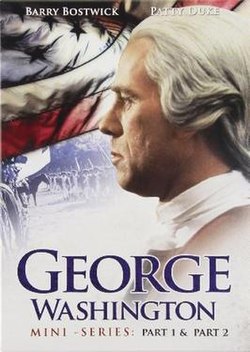| George Washington | |
|---|---|
 | |
| Genre | Biography Drama History War Miniseries |
| Based on | George Washington by James Thomas Flexner |
| Screenplay by | Jon Boothe Richard Fielder |
| Directed by | Buzz Kulik |
| Starring | Barry Bostwick Patty Duke Astin |
| Theme music composer | Laurence Rosenthal |
| Country of origin | United States |
| Original language | English |
| No. of episodes | 3 |
| Production | |
| Producers | Richard Fielder Buzz Kulik David Gerber |
| Cinematography | Harry Stradling Jr. |
| Editors | Donald Douglas Mel Friedman Les Green David Wages |
| Running time | 480 minutes |
| Production companies | David Gerber Productions MGM/UA Television |
| Original release | |
| Network | CBS |
| Release | April 8 – April 11, 1984 |
| Related | |
George Washington is a 1984 American biographical television miniseries directed by Buzz Kulik. The series, in three parts, chronicles the life of George Washington, the first President of the United States from the age of 11 to the age of 51. [1] George Washington is based on the biography by James Thomas Flexner.
Contents
The miniseries was shot mainly on location near Washington, DC and Philadelphia, and was aired on April 8, 10 and 11, 1984. [2] Washington's life in the French and Indian War, the second part shows the coming and commencement of the Revolutionary War and the final part describes the victory of the independence from Great Britain. It was nominated for six Primetime Emmys.
In 1986, a sequel, George Washington II: The Forging of a Nation , aired with Bostwick and Duke reprising their roles as George and Martha Washington, respectively.